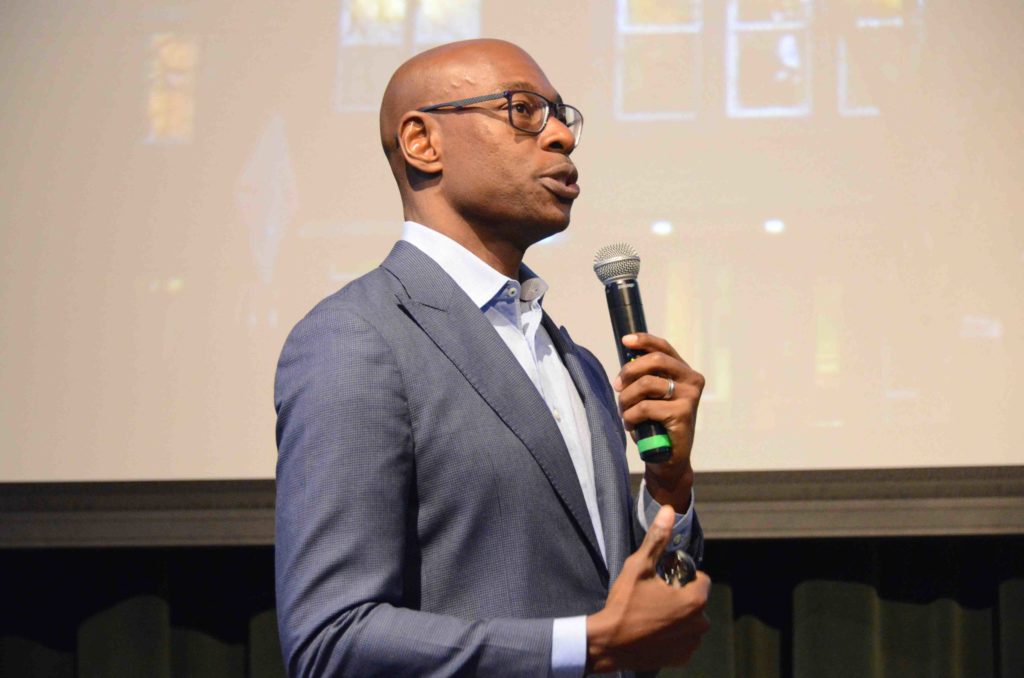Hakeem Rahim Helps Eliminate the Mental Health Stigma
On October 21, Hakeem Rahim delivered a personal and important Hall about his struggle with mental health, and about eliminating the stigma related to those struggles. Mr. Rahim was the first African American male valedictorian in his high school’s history, and he graduated with honors from Harvard with a degree in psychology. He went on to earn dual masters’ degrees from Columbia University’s Teachers College. But, as he will tell you, those accomplishments and accolades tell only a slice of his story. Since 2012, he has become a leading speaker on mental health issues, and a vocal advocate of mental health awareness and education. He has testified in front of Congress and the Senate to improve the quality and accessibility of mental health care in the United States; he has been featured in USA Today; and he founded I Am Acceptance, a non-profit organization focused on empowering the next generation on topics related to mental wellness. Mr. Rahim is also the founder of Live Breathe and of OMA, a digital experience for young people supporting wholeness and wellness.
Mr. Rahim began his talk with a very different story of his life, beginning with the day he showed up at Harvard for his freshman year. Not long after his proud parents dropped him off at his dorm, Mr. Rahim began spiraling. At a party with his friends, the room began to close in on him and he felt like he couldn’t breathe. When he became interested in poetry, he became so afraid that his creativity would suffer if he fell asleep that he spent two weeks sleeping only three hours a night. He began seeing and hearing things that weren’t there, and he began to believe he could speak Russian.
Finally, a friend called Mr. Rahim’s parents to tell them what was going on. They drove to campus and checked him into the hospital, where he stayed in the psychiatric ward for two weeks. It was during that time that Mr. Rahim was diagnosed with bipolar disorder, and his psychologist explained to him that he had been experiencing a manic episode, which can include disordered thoughts, decreased need for sleep, and hallucinations.
Mr. Rahim credits his friend, who noticed he wasn’t alright; his parents, who took him to the hospital; and his psychologist, who educated him about what was going on in his own body. Together they helped to pull Mr. Rahim out of exhaustion and fear, empowering him to live a healthier life. He offered three key take-aways to RL boys who might be going through a difficult time, or know someone who is:
Seek support. “Sharing creates space for others to share,” Mr. Rahim said. Without his friends and family, he would have continued to suffer with undiagnosed bipolar disorder, going through bouts of extreme depression and extreme mania in perpetuity. Seeking out support from a close friend, trusted adult, or therapist is key to your health and the health of others, he said.
Educate yourself. “Mental health challenges impact our thoughts, feelings, physiology, and behaviors,” said Mr. Rahim. By listening to his inner thoughts, recognizing his feelings, asking himself how his body feels, and reflecting on his actions, Mr. Rahim can stay in touch with himself and know when he is experiencing a mental health challenge. He stressed the importance of knowing potential symptoms of—as well as tools for mitigating—some of the most common mental health challenges, including anxiety and depression.
Affirm yourself. “I accept myself for not always being my best,” said Mr. Rahim, “Because I know we are all human and everyone messes up. And I will be lighter on myself as I move through my days.” This format (I accept myself for…; Because I know…; And I will…) is the foundation of what Mr. Rahim calls an Acceptance Statement. These statements (and positive self-talk in general) are a powerful tool when we are struggling. “I accept myself for the fact that I take medication,” he said. “Because I know it does not define me. And I will continue to take my meds.”
Before leaving us (lighter and more empowered than he found us!), Mr. Rahim offered a hopeful and affirming message: “Your deepest pain could be the platform for your highest purpose.”
This Hall was part of a three-part series of morning conversations on mental health, bystander intervention, and healthy engagement with technology. As a trio, these Halls are supporting RL boys in their development of a robust sense of self-awareness, resilience, and agency.

